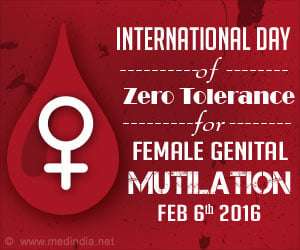- Female genital mutilation, which involves injuring the female genitalia for non-medical reasons is recognized as a human rights violation
- It is estimated that some 200 million girls and women globally have undergone some form of female genital mutilation
- International Day of Zero Tolerance to Female Genital Mutilation coordinates the systematic efforts needed to end this practice
Female genital mutilation
Go to source).
Ending Female Genital Mutilation by 2030
Female genital mutilation (FGM) comprises all procedures that involve altering or injuring the female genitalia for non-medical reasons. It results in complications such as severe pain, shock, excessive bleeding, infections, and difficulty in passing urine, as well as long-term consequences for their sexual and reproductive health and mental health.Although primarily concentrated in 30 countries in Africa and the Middle East, female genital mutilation is a universal problem and is also practiced in some countries in Asia and Latin America. It continues to persist among immigrant populations living in Western Europe, North America, Australia, and New Zealand.
Over the last 25 years, the prevalence of FGM has declined globally. However, in the face of humanitarian crises such as disease outbreaks, climate change, armed conflict and more could cause a rollback of progress toward achieving gender equality and the elimination of FGM by 2030.
Key Facts
- Globally, it is estimated that at least 15 million additional girls between ages 15 and 19 will be subjected to some form of FGM by 2030 (1✔ ✔Trusted Source
Female genital mutilation
Go to source). - FGM is mostly carried out on young girls, sometime between infancy and age 15.
- FGM causes severe bleeding and health issues, including cysts, infections, infertility, as well as complications in childbirth, increased the risk of newborn deaths.
- FGM is a violation of the human rights of girls and women.
- The highest prevalence of FGM among young girls below 14 years of age is seen in Gambia at 56 percent, Mauritania at 54 percent, and Indonesia.
- Countries with the highest prevalence among girls and women aged 15 to 49 are Somalia 98 percent, Guinea 97 percent, and Djibouti 93 percent.
Men End FGM
With eight years remaining in this decade of action, 2023’s theme will be “Partnership with Men and Boys to transform Social and gender Norms to End FGM" (2✔ ✔Trusted SourceEnding Female Genital Mutilation by 2030
Go to source).
Men and boys as brothers, fathers, health workers, teachers, and traditional leaders – can be powerful allies in challenging and ending this scourge. Their voices and actions can transform deeply rooted social and gender norms, allowing girls and women to realize their rights and potential in terms of health, education, income, and equality.
To promote the elimination of female genital mutilation, coordinated and systematic efforts are needed, and they must engage whole communities and focus on human rights, gender equality, sexual education, and attention to the needs of women and girls who suffer from its consequences.
Let us all Join the online campaign this year and participate on social media. Share with the world about #MenEndFGM. On the International Day of Zero Tolerance to Female Genital Mutilation, let’s commit to social change and strong partnerships to put an end to female genital mutilation once and for all.
References:
- Female genital mutilation - (https://www.unfpa.org/female-genital-mutilation)
- Ending Female Genital Mutilation by 2030 - (https://www.un.org/en/observances/female-genital-mutilation-day)
Source-Medindia











